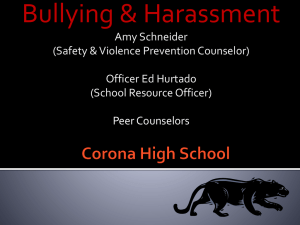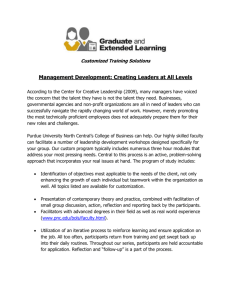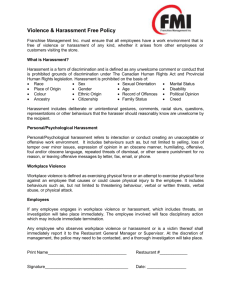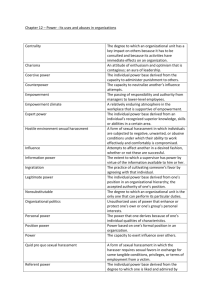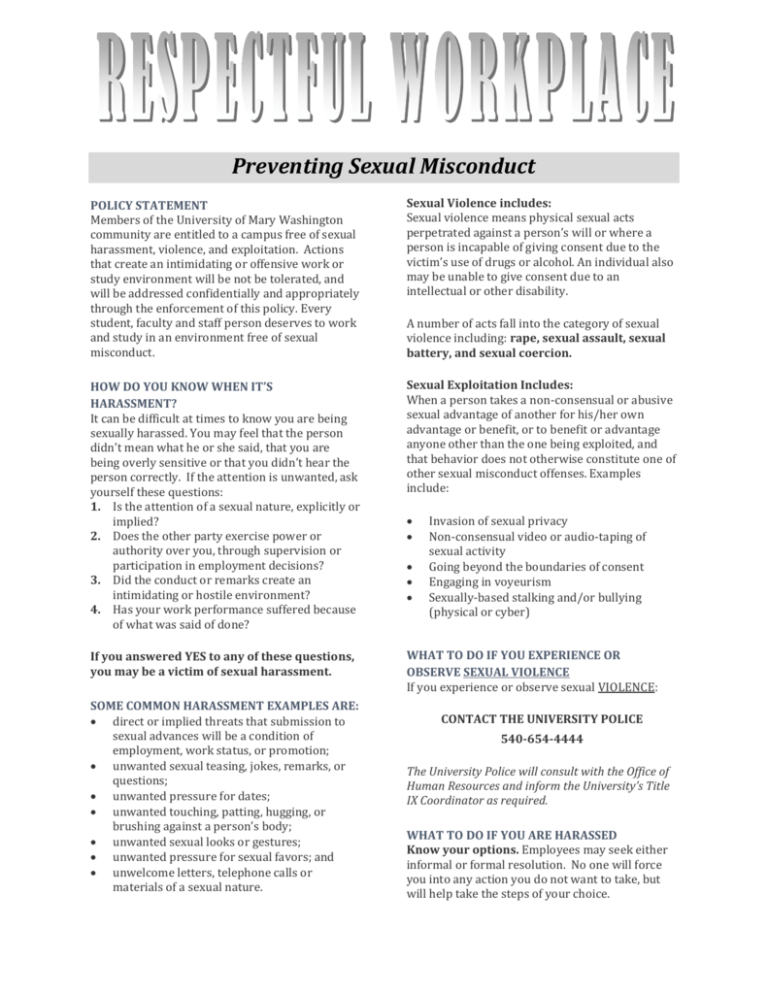
Preventing Sexual Misconduct
POLICY STATEMENT
Members of the University of Mary Washington
community are entitled to a campus free of sexual
harassment, violence, and exploitation. Actions
that create an intimidating or offensive work or
study environment will be not be tolerated, and
will be addressed confidentially and appropriately
through the enforcement of this policy. Every
student, faculty and staff person deserves to work
and study in an environment free of sexual
misconduct.
Sexual Violence includes:
Sexual violence means physical sexual acts
perpetrated against a person’s will or where a
person is incapable of giving consent due to the
victim’s use of drugs or alcohol. An individual also
may be unable to give consent due to an
intellectual or other disability.
HOW DO YOU KNOW WHEN IT’S
HARASSMENT?
It can be difficult at times to know you are being
sexually harassed. You may feel that the person
didn’t mean what he or she said, that you are
being overly sensitive or that you didn’t hear the
person correctly. If the attention is unwanted, ask
yourself these questions:
1. Is the attention of a sexual nature, explicitly or
implied?
2. Does the other party exercise power or
authority over you, through supervision or
participation in employment decisions?
3. Did the conduct or remarks create an
intimidating or hostile environment?
4. Has your work performance suffered because
of what was said of done?
Sexual Exploitation Includes:
When a person takes a non-consensual or abusive
sexual advantage of another for his/her own
advantage or benefit, or to benefit or advantage
anyone other than the one being exploited, and
that behavior does not otherwise constitute one of
other sexual misconduct offenses. Examples
include:
If you answered YES to any of these questions,
you may be a victim of sexual harassment.
WHAT TO DO IF YOU EXPERIENCE OR
OBSERVE SEXUAL VIOLENCE
If you experience or observe sexual VIOLENCE:
SOME COMMON HARASSMENT EXAMPLES ARE:
direct or implied threats that submission to
sexual advances will be a condition of
employment, work status, or promotion;
unwanted sexual teasing, jokes, remarks, or
questions;
unwanted pressure for dates;
unwanted touching, patting, hugging, or
brushing against a person’s body;
unwanted sexual looks or gestures;
unwanted pressure for sexual favors; and
unwelcome letters, telephone calls or
materials of a sexual nature.
A number of acts fall into the category of sexual
violence including: rape, sexual assault, sexual
battery, and sexual coercion.
Invasion of sexual privacy
Non-consensual video or audio-taping of
sexual activity
Going beyond the boundaries of consent
Engaging in voyeurism
Sexually-based stalking and/or bullying
(physical or cyber)
CONTACT THE UNIVERSITY POLICE
540-654-4444
The University Police will consult with the Office of
Human Resources and inform the University’s Title
IX Coordinator as required.
WHAT TO DO IF YOU ARE HARASSED
Know your options. Employees may seek either
informal or formal resolution. No one will force
you into any action you do not want to take, but
will help take the steps of your choice.
Informal Resolution
If comfortable, say “NO” to the harasser. Use a
direct and honest approach to tell the harasser
you do not like the activity and expect it to stop.
May be initiated with the AA/EEO officer
located in the Office of Human Resources at
(540) 654-1214.
Seek assistance from HR or one of the University
contact persons (list available from HR). Call 6541214.
Must be initiated within one year from the
date of the alleged harassment.
Don’t ignore the harassment. Deal with the
situation immediately, seeking assistance if
necessary.
The complainant must be (or have been) a
member of the University community at the
time of the alleged harassment.
The complaint must be in writing and must
be signed. It must describe the alleged
behavior and state the remedy sought.
Keep detailed records of all harassing activities
(time, place, nature of the harassment and
witnesses if any).
Formal Resolution
The complaint procedure can be found in the
policy on the HR website:
http://adminfinance.umw.edu/hr/policies-andprocedures/respectful-workplacepolicies/university-sexual-harassment-andconsensual-relations/policy
Preventing Workplace Harassment and Discrimination
UNIVERSITY OF MARY WASHINGTON
STATEMENT OF NONDISCRIMINATION
The University of Mary Washington subscribes to
the principles of equal opportunity and
affirmative action. The University does not
discriminate on the basis of race, color, religion,
disability, national origin, political affiliation,
marital status, sexual orientation, sex, pregnancy
or age in recruiting, admitting, and enrolling
students or in hiring and promoting faculty and
staff members. This statement of
nondiscrimination extends to all aspects, terms,
and conditions of employment and student tenure.
DEFINITION AND EXAMPLES OF WORKPLACE
HARASSMENT
The University of Mary Washington strictly
forbids discriminatory harassment of any
employee, applicant for employment, vendor,
contractor or volunteer. Discriminatory
harassment is defined as any unwelcome verbal,
written, and/or physical conduct that either
denigrates or shows hostility or aversion towards
a person on the basis of race, color, religion,
disability, national origin, political affiliation,
marital status, sexual orientation, sex, age, or
pregnancy and:
(1) has the purpose or effect of creating an
intimidating, hostile, or offensive work
environment;
(2) has the purpose or effect of unreasonably
interfering with an employee’s work performance;
or
(3) affects an employee’s employment
opportunities or compensation.
Examples:
(a) Unwelcome and repeated use of degrading
language, jokes, or innuendos;
(b) Threats or insinuations about conditions of
employment; and
(c) Offensive pictures or objects.
IF HARASSMENT HAS OCCURRED:
Employees and third parties should report
incidents of workplace harassment as soon as
possible after the incident occurs.
UMW COMPLAINT PROCEDURE
An employee may address a complaint with the
immediate supervisor or with the AA/EEO Officer.
Please call 654-1214. Under no circumstances will
the individual alleging harassment be required to
file a complaint with the alleged harasser.
STATE AND FEDERAL COMPLAINT PROCEDURE
Office of Equal Employment Services within the
Department of Human Resource Management
(804-225-2136).
U.S. Equal Employment Opportunity
Commission. (202-663-4900)
Retaliation Is Prohibited
Retaliation is overt or covert acts of reprisal,
interference, restraint, penalty, discrimination,
intimidation, or harassment against an individual
or group bringing forth a harassment
complaint. If retaliation occurs, the employee(s)
should report the retaliation through the
complaint procedure.
POLICY VIOLATIONS
Engaging in Harassment: Any employee who
engages in conduct determined to be harassment
or who encourages such conduct by others shall
be subject to corrective action,
which may include discharge from employment.
Allowing Harassment to Continue: Managers
and/or supervisors who learn of workplace
harassment and fail to take appropriate corrective
action may be considered a party to the offense,
whether they engaged in such behavior or not.
Failure to Respond: Managers and/or
supervisors who fail to take appropriate action
shall be subject to disciplinary action, including
demotion or discharge.
Preventing Workplace Violence
UMW POLICY STATEMENT
The University of Mary Washington is committed to
maintaining a workplace free from threats and acts
of intimidation and violence. All reported incidents
will be properly investigated.
WHAT CONSTITUTES WORKPLACE VIOLENCE?
Workplace Violence can be defined as actions or
words that endanger or harm another employee or
result in other employees having a reasonable belief
that they are in danger. Such actions include:
• Injuring another person physically;
• Behavior that creates a reasonable fear of injury in
another;
• Possessing, brandishing, or using a weapon that is
not required for work while on state
premises or doing state business;
• Intentionally damaging property;
• Threatening to injure an individual or to damage
property;
• Committing injurious acts motivated by or related
to domestic violence or sexual harassment;
• Retaliating against any employee who, in good
faith, reports a violation of this policy;
• Behavior that subjects another individual to
extreme emotional distress.
WHAT ARE SOME WAYS TO PROTECT THE
WORKPLACE FROM VIOLENCE?
• Lock certain doors;
• Limit office access;
• Designate an unobstructed secondary exit,
whenever possible;
• Establish a “code word” or other signal to convey
the need to summon Campus Police
for help;
• Avoid leaving keys or purses lying about in the
office;
• Notify police if you notice suspicious persons or
vehicles, especially after working hours;
• Post emergency numbers at every phone;
• Keep potential weapons of opportunity (scissors,
paperweights, letter openers) out of casual reach of
customers;
• Know and watch out for your co-workers;
• Dial Campus Police at 4444 in the event of an
emergency!!
WHAT ARE SOME WAYS A SUPERVISOR CAN
PREVENT WORKPLACE VIOLENCE?
• Ensure that all employees are aware of the
Workplace Violence policy;
• Inform all employees of emergency procedures;
• Manage operations and personnel carefully and
thoughtfully with open communication;
• Be alert to dramatic changes in behavior;
• Respond to all complaints of violence;
• Make proper referrals to the Employee Assistance
Program (EAP) by contacting the Office of Human
Resources for assistance;
• Take threats of violence very seriously and dial
4444 in case of an emergency.
WHAT TO DO WHEN CONFRONTED WITH AN
IMMEDIATE THREAT:
- Take immediate actions to ensure safety;
- Call Campus Police at 4444 or press one of the blue
buttons on campus; and
- Follow up with the Office Human Resources.
POLICY VIOLATIONS
In cases where you feel that the Workplace Violence
Policy has been violated you can notify:
• An immediate supervisor;
• The Office of Human Resources.
The Office of Human Resources will manage reports
of workplace violence in a manner that protects the
safety and anonymity of anyone who comes
forward. Acts of violence will be subject to
disciplinary action, up to and including termination,
based on the situation. Acts of violence occurring
outside the workplace also may be grounds for
disciplinary action, up to and including dismissal. In
these situations, the agency must demonstrate that
the violent conduct committed has an adverse
impact on the employee’s ability to perform his or
her assigned duties and responsibilities or that it
undermines the effectiveness of the agency’s
activities.
Office of Human Resources
RESPECTFUL WORKPLACE POLICIES
Volunteer Name:
I have read the provided UMW policy information on:
Preventing Workplace Harassment and Discrimination
Preventing Workplace Violence
Preventing Sexual Harassment
I agree to adhere to the University of Mary Washington’s Respectful Workplace Policies.
Signature
Date


